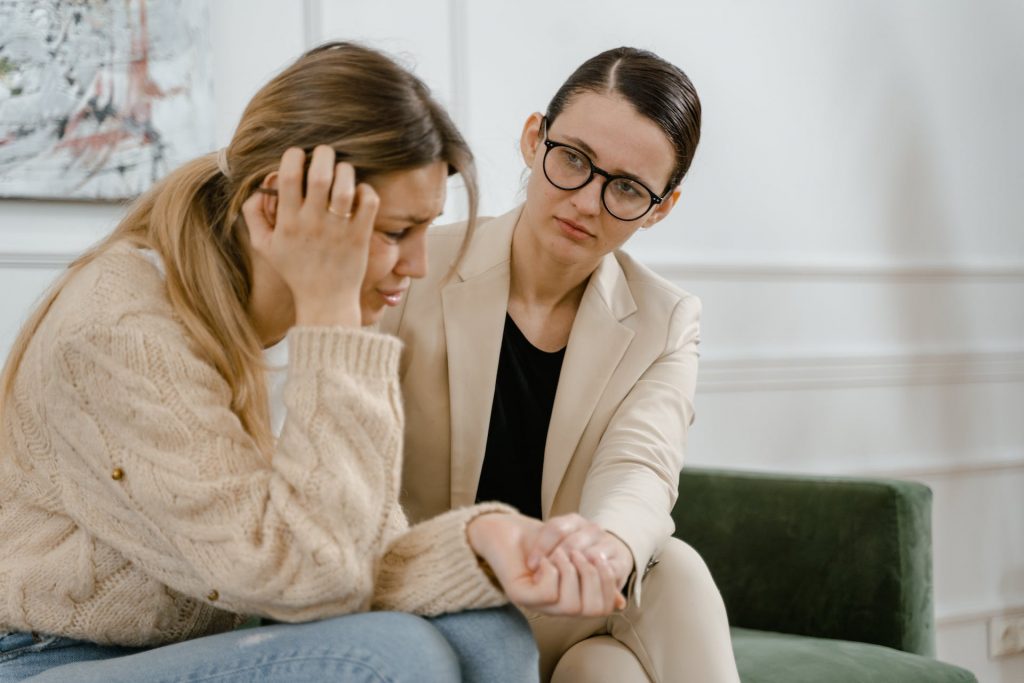
25 Jan THE BENEFITS OF COUNSELLING
THE BENEFITS OF COUNSELLING
If you are struggling with grief after a bereavement then psychotherapy, or counselling, can be a valuable tool on the road to healing.
And, as explained in the article Recognising The Signs Of Traumatic Bereavement, it is important that you seek professional assistance if you are struggling to function, or are turning to coping mechanism such as alcohol of drugs, long after the loss has taken place.
I can’t say enough about the benefits of counselling. I believe that everyone, no matter what has happened in their live, should do counselling if they can. As adults, we get triggered in different situations which are, while we may not recognise it, linked to our childhood, and which, if we want to, we can investigate to understand ourselves better and to realise what we do and why.

This will help us lead a more peaceful and contented life. While counselling will not prevent emotions from arising, it will help you deal with them quicker and more effectively.
There are so many different types of counselling and therapies out there that it can be daunting to choose one over another, or any at all.
How to Find the Right Therapy for You
The most important thing is to do your homework before selecting a therapist. While the right therapist and right form of therapy can do wonders, the opposite is also true. If the therapist or therapy are a bad fit for your needs then this can actually cause more harm to your mental health and wellbeing than good.
You must, of course, pick what feels best for you, but not before talking to friends and family, if you can, to see what their experiences of a particular type of therapy or certain therapist or practice have been like.
Likewise, read about different types of therapies. There is a wealth of good, reliable information online and a multitude of books that will help you come to understand and define what could work best for you. You should be aware that not all therapies are created equal. While some, such as cognitive behavioural therapy and art therapy are fully recognised, with significant medical research supporting them, there are many others which are not so robustly tested. Some may be out and out quackery, but it’s only by performing due diligence that you will come to spot the ones to avoid.
Lastly, check out registers of professional therapists to ensure that you are choosing an accredited expert, and visit their website to read what their former clients have said about their work. If these are not displayed, ask the therapist you are keen on working with to provide these before committing.
Personally, I always tend to favour a more holistic approach — one which focuses more on the individual as a whole; a therapy that’s not only focused on the mind but also the body and spirit, and how these interconnect. Your preferences may, of course, be different, and that’s absolutely fine.
I was lucky that my therapist took this holistic approach to treatment. Before we started our sessions, I already knew him a little as he is the father of a friend of my nephew. This prior familiarity was certainly a plus in my books.
Whichever route you take, some of the main recognised benefits of grief counselling/therapy include …
• Managing emotions and anxiety
• Developing increased confidence
• Improving relationships
• Promoting resilience and improving stress management
• Degreasing depressive symptoms
• Finding renewed purpose
• Increase self awareness
• Improving health (mental, emotional, and physical)
• Improving communication
• Dealing with negative emotions and altering negative behaviours
• Fostering a different perspective
• Bringing greater peace of mind
• Encouraging self-exploration, self-discovery, and self-growth
• Providing a safe space to vent
There is still, sadly, a stigma around matters of mental health, with many people not wanting others to find out that they are seeking therapy because of this. While the situation across societies is improving as we become more enlightened, if you live somewhere in which that stigma is still prevalent then please do not let it stop you from getting the help and support you need. Any problems with scientifically supported forms of therapy as a legitimate form of healthcare are rooted in outdated and ill-informed prejudice and nothing more.
One thing to bear in mind with therapy is that you have to be invested in the process to get the most out of it. You must be open to communicating your thoughts and your feelings to investigate your inner workings and to try and make sense of them. It’s easier said than done, of course, and ego or pride can get in the way, as can fear about what you might learn or how you might change. While some may be judgemental and describe therapy or counselling as a sign of weakness, nothing could be further from the truth. Indeed, I firmly believe that it shows courage and strength. It’s not easy to open up to someone and tell them your deepest fears, pains, and concerns.
In the beginning, I found it hard to tell my therapist all that was going on within me. It was difficult to express what I was feeling because it not only meant that I had to face it but to feel it again. It seemed that every session was the same as the one before and that I was continually repeating myself, perhaps to the point of my therapist becoming bored of hearing the same things. But, after a while, the talking became easier, the pain lessened, and I became interested to see what my interpretations or reactions to situations could mean.
My therapist never told me but helped me find my own way. This was also hard but having to figure it out for myself gave me a big self-confidence boost and showed me that I was able to figure things out if I only took the time and was patient.
Therapy isn’t magic; it’s not going to wipe away your tears and grief with the swoosh of a wand. But it will help you to make better sense of things, to see things from a more balanced perspective, and to allow yourself great compassion, aiding you along your healing journey, and even getting you back on the road if that journey has temporarily stalled for any reason.
The ‘aha!’ moments may come flowing or be few and far between, but either way you will come away from therapy, as long as it’s the right therapy for you, in a better state than you entered.
KEY TAKEAWAYS
- Understand the significant role counselling plays in the healing process, particularly when coping with grief after a bereavement. Acknowledge that seeking professional assistance can be crucial if you are struggling with daily functioning or are resorting to harmful coping mechanisms.
- Explore different types of counselling and therapies, considering their diverse approaches. Recognise that what works best for you may vary, and it’s essential to do thorough research before selecting a therapist or therapy.
- Try to overcome any stigmas associated with seeking therapy. Understand that seeking help is an act of courage and strength, not weakness.
- Be invested in the therapy process, open to communicating thoughts and feelings, and being willing to explore inner workings. Acknowledge that therapy requires time, patience, and a commitment to self-discovery for optimal benefits.



